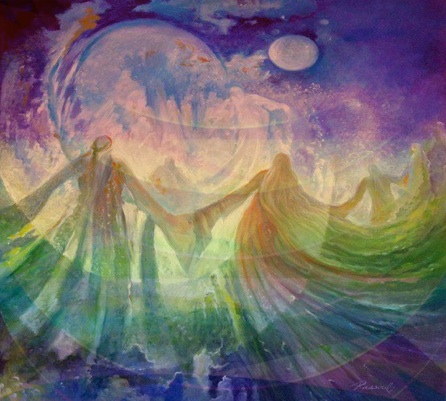There
are some questions that don’t allow for short answers, that open things up that
can’t be simply put back in their can. “Harry, how was it you got that scar
again?” “Ishmael, did you ever happen to meet a ship’s captain, name of Ahab?” “What
an interesting piece of jewelry around your neck, Frodo!” Well, when the
disciples ask Jesus, “where are you staying?” that ends up being one of those
questions too, whose answer is very much longer than the question.
These
are the first words spoken to Jesus in John’s gospel and, in a sense, the whole
rest of the gospel is answer to that question. Now, it’s not an episode of Cribs.
These soon-to-be-disciples may well have just been interested in Jesus’ temporary
lodgings, but Jesus hears a much deeper question in there. That word that we
have translated ‘staying’ – μενω
–
that’s a perfectly accurate translation, perfectly prosaic, for what I’m sure
was a prosaic question, but that word occurs again and again in John’s gospel,
and is translated in many different ways. Five chapters later, Jesus will use
that verb and when we hear that gospel passage (this summer) we’ll hear the
English word ‘endure.’ “Do not work for food that perishes, but for food that
endures for eternal life.” Sometimes it’ll be ‘remains.’ In that same chapter 6, “if you eat my flesh
and drink my blood, you will remain in me and I remain in you.” Later, “if you
remain in my word, you will truly be my disciples.” “Remain in my love.” Sometimes,
it’s ‘dwells.’ “The Father dwells in me.” “The Spirit dwells in you.”
These novice
disciples might think they’re asking a simple question, but the answer extends
through some of the most beautiful promises and challenging summonses of the
gospel. The root of it all is the close loving union between Father, Son and
Spirit, who remain with each other, dwell with each other. “Stay” wouldn’t
really work here, because it sounds kind of temporary. God the Father doesn’t
just ‘stay’ with Jesus, as if they’re roommates. No, the bond between Father,
Son and Spirit is the Love from which all love takes its name. Before there was
time (and I know you can’t say ‘before’ without time, but that’s how out of our
ability to grasp this is), before there was time, God was Love. Saint Gregory
of Nazianzus talked about the divine perichoresis, the godly dancing
around each other that might be the closest human language can come to naming
what’s going on between Father, Son and Spirit.
“You
want to see where I dwell? Come and see.” Jesus says. Come and see. Come and
see what love looks like. This electrifying tango, virtuoso pas de deux,
which loses nothing of tenderness. Persons relating to persons as persons are
meant to, delighting in one another, exuberantly and gently. And it’s not just
an invitation to look from a distance. “Remain in me as I remain in you.” “Remain
in my love.” Jesus comes to invite us into that dance, into that love whose
sparks set us aflame. That’s another reason why ‘stay’ wouldn’t really work as
a translation, because while Jesus dwells with God the Father, he doesn’t stay
with Him in any sense that would present him coming to us.
“If you
eat my flesh and drink my blood, you will dwell with me.” He comes here, on
this altar to invite us to this feast. And he comes here to invite us to
delight in one another, to start to step into that dance in the here and now,
and every part of our lives. Because in heaven, living love always looks like
an amazing joy that we can’t even fathom now, and here on earth living love
sometimes looks like a foretaste of that. But love isn’t love only when it’s
pleasant. Love is at its loveliest when it’s hard. “Come and see.” “See how I
love my betrayer. See how I love you when you run from me. See how I love the
ones who shed my blood.”
Love is
at its most brilliant when we are too overwhelmed with love for the other to
have time to stop and think about ourselves. And sometimes that looks like the
giddy abandon of joining the dance. And sometimes it looks much harder than
that.
As this
country remembers Dr. King this weekend, I think of his love, and the love he
dreamed of. He dreamed of a love powerful enough to have different faces. I’m sure
we all know his dream of “little black boys and black girls [joining] hands
with little white boys and white girls.” The dancing around kind of love. But
this week I sat down to read a different sermon of his (I tried to read a new
one each year around this time), this one was about the Good Samaritan. He cut
right to the heart of that parable, I think, when he said of the priest and the
Levite (the ones who don’t stop to help the man who’s been robbed and left for
dead in the ditch), “their first question is, what will happen to me if I help
this man?” But the Samaritan, his question is “what will happen to this man if
I don’t help him?”
That’s
love. That’s where Jesus dwells. That’s where he comes to call us.

No comments:
Post a Comment